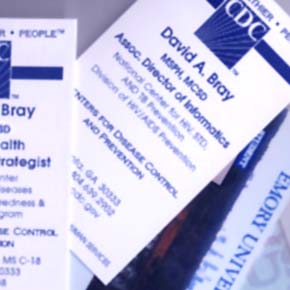David Bray's professional online CV . | ||||
|
w h a t d r i v e s y o u ? Professionally, I am concerned that the U.S. lacks a modern information technology strategy for national security. For part of my PhD research, I researched bottom-up approaches to inter-organizational collaborations that national security efforts must develop to successfully share knowledge within and across organizational assets. Without technology-aided collaborations and knowledge sharing activities that span agencies, U.S. national security will be limited in its ability to analyze intra- and international social transactions for aberrant patterns. For a fuller, more holistic approach to intelligence gathering, the U.S. government needs to cultivate more vibrant knowledge ecosystems. My research at Emory, the University of Oxford, MIT, and Harvard explores knowledge technology strategies that promote collaboration between government agencies -- and encourage partnerships with members of the private and academic sectors -- to share relevant knowledge for successful inter-agency collaborations. Such knowledge ecosystems can assist with the identification of potential geopolitical concerns and support appropriate response if necessary (e.g., law enforcement for terrorists or drug cartels, U.N. aid for refugees, or public health for infectious diseases). Through application of these findings, improved inter-organizational information collaborations, to include augmented group cognition and emerging virtual institutions, follow from this empirical research. The CIA's Global Trends 2015 report predicts governments will have less control over flows of information, technology, diseases, migrants, arms, and financial transactions across their borders. The ability and agility to form partnerships to exploit increased information flows increasingly depends on effective governance. I believe all of this can be performed while preserving the freedom of privacy that is a core tenet of a free democracy. Public key encryption can allow collected data to be de-identified and kept anonymous, unless probable cause is found as to illicit activity. Anecdotally, right now we (humans) try to make sense of all the information on the web. We try to write algorithms to probe, expend some energy, and attempt bring some order to the mess we have made. This is inefficient. The amount, and complexity, of the information out there is growing at an exponential rate. The human brain, even if aided by technology, cannot assimilate this proliferation of increased bandwidth and available sources of bandwidth. Moreover, human bureaucracy isn't built to move fast. That is intrinsic to its nature as you don't want the IRS to suddenly change overnight and raise taxes by 20%; rather, human bureaucracies often are intended to be constant and slow to change. But with more and more data and information streams, how can we expect human systems and/or bureaucracy to respond to the changing world dynamics and pressures? We cannot, nor can bureaucracy, like a battleship trying to do a tight turn around, do this alone. r e s e a r c h To seek and learn truth, to link human and technology endeavors to beneficial outcomes. —David Bray |


Curriculum Vitae as PDF
National Security . Knowledge Management |
|||
Return to main . David Bray's LinkedIn page, Bepress publications, and online CV |
||||